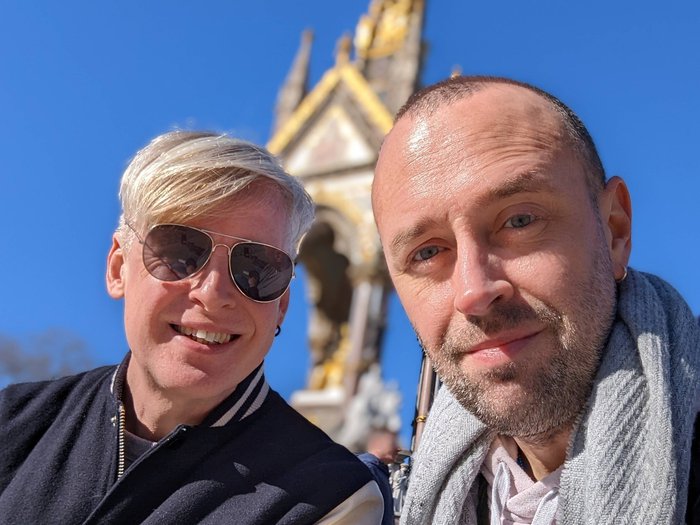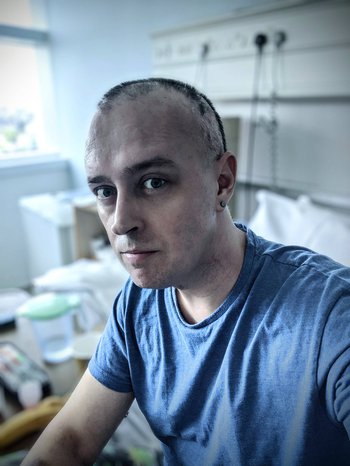What I’ve learnt as a gay man with blood cancer
Scott explains the benefits of honest communication about your life, health and sexuality when you’re diagnosed with blood cancer.

Scott (right) with his husband Tris
I was diagnosed with multiple myeloma a month before my 40th birthday, so from the start I knew there would be few people my own age in the same boat – let alone many who are also LGBT+.
But my experience of the healthcare system as a gay man has been surprisingly smooth. And I have learned some valuable lessons that can benefit any blood cancer patient, regardless of their sexuality or gender identity.
I have been out and proud for 24 years. Indeed my husband, Tris, and I have worked together in LGBT+ media for over two decades, so we never hide our sexuality.
That helped from the outset. It meant he was with me when I received my diagnosis – likely the worst day of anybody’s life. Having someone with you for those crucial appointments is not just about the comfort they bring. They also take in information far better than you will when your head is spinning and help you make sense of what the doctors tell you.
On that first day I noticed that several of the hospital staff were wearing LGBT+ rainbow lanyards, including the nurse giving me my bone marrow biopsy. If you ever doubted the value of symbols like that, let me tell you how reassuring it can be in those dark moments. For me, those colours meant everyone would be treated with respect – LGBT+ or not.
In fact, there are very few differences for an LGBT+ person with myeloma.
But the more open you can be with your medical team about your life, your circumstances and other health issues, the better they can care for you.
For example, many gay and bi men now take “PrEP” – a regular tablet that can prevent you from contracting HIV. But those tablets can cause kidney damage in some cases, and myeloma can also attack your kidneys. Likewise, some gay guys are big gym-goers and use protein supplements to bulk up. It may be safe to continue with both of those or you may have to adjust. The important thing is to be able to discuss it with your consultants.
Early on, the doctors checked I’d had a recent HIV test. Sexually transmitted infections like HIV and syphilis can complicate myeloma. But you can live well with both myeloma and HIV – indeed one of the friends I have made on this journey has been doing so for years. So don’t be afraid to test.
On that subject, most of us take our sexual health seriously. If you don’t already, you should start.
Make sure your sexual health clinic knows you have blood cancer and about any treatment you are on. It’s just as important that they are informed.
In the few weeks leading up to me writing this, I have been proud to see so many gay and bi guys step up to fight a new monkeypox outbreak. Many queued for hours to get vaccinated. LGBT+ people have shown us all there’s no place for shame when it comes to your health.
I’ve tried to carry that same attitude throughout my myeloma journey. You may well have some unpleasant side effects – vomiting and diarrhoea are just the start. But whatever it is, it’s nothing to be embarrassed about and, certainly, nothing you should hide from your doctor or clinical nurse specialist (CNS). That way you can solve most problems swiftly.
One thing any myeloma patient may encounter, gay or straight, is a drop in libido. You will be too tired to even think about sex at some points. That can be hard on you and your partner(s). But in most cases, this is temporary. Again, I advise honesty and communication.
That goes along with changes in your body. While on steroids, I gained two stone then lost a stone in a fortnight while having my stem cell transplant. Yo-yoing weight or losing your hair can be hard for anyone to cope with and a few idiotic comments from people didn’t help.

The only good news I can share is I’m now fitter and have more energy than I had for years before my diagnosis.
Sadly many LGBT+ people have faced rejection or prejudice and have poorer mental health and higher levels of anxiety than others. Myeloma can obviously bring that to the fore. This isn’t unique to us and I’ve seen it in straight friends too, of course.
Mental health provision is woefully underfunded in the UK. But you should, of course, seek help. Everyone will find their own way through. I’ve been lucky to have incredible friends and family. I can only advise that the more you share, the more people can help.
I’m delighted to write this because I found very few LGBT+ people represented in the literature and websites about myeloma. I hope this helps a little to address that.
However, I know I’m fortunate. I live in London and those in less metropolitan areas or without my support network may find this all harder. But know you are not alone. Reach out, even to strangers, and you will find support.
Three years after diagnosis, I’m in remission, happy and looking forward to the future. I’m excited by the pipeline of myeloma treatments and have great support around me. Moreover, I have found others – of all ages and LGBT+ and not – to share this journey with. Together, and with the support of organisations like Blood Cancer UK, we are stronger.
Read Stewart's story about seeking support as a queer person with blood cancer.
Contact our Support Service to talk through any worries you have, whether you have blood cancer yourself or are close to someone who does.
